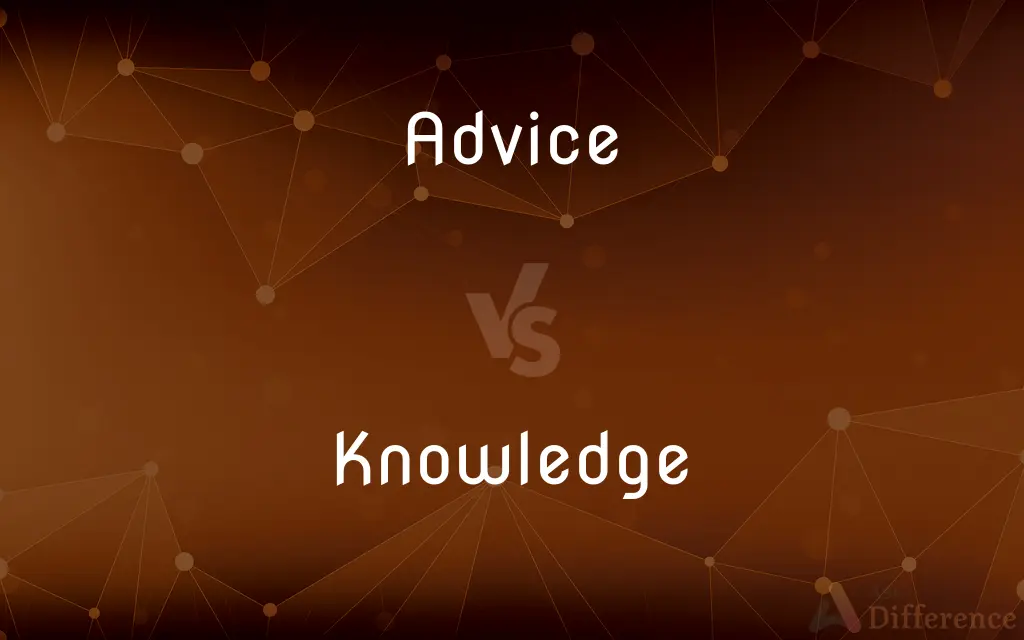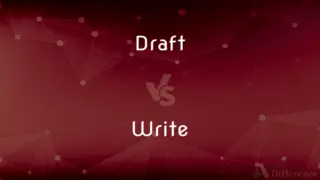Advice vs. Knowledge — What's the Difference?
By Tayyaba Rehman & Maham Liaqat — Updated on April 4, 2024
Advice is guidance or recommendations on prudent future action, while knowledge is information, understanding, or skill obtained through experience or education.

Difference Between Advice and Knowledge
Table of Contents
ADVERTISEMENT
Key Differences
Advice is inherently action-oriented, offering suggestions or counsel on what could or should be done in specific situations. In contrast, knowledge is more static, comprising facts, information, and skills acquired through experience or education. While advice seeks to influence decisions and actions, knowledge provides the foundation upon which advice is formulated, highlighting the dynamic vs. static nature of these concepts.
The sources of advice and knowledge also differ; advice is often given by individuals based on their personal experiences, beliefs, or professional expertise. Knowledge, however, can come from a variety of sources, including books, research, observation, and personal experiences. This difference underscores the subjective nature of advice versus the objective or empirical basis of knowledge.
In terms of purpose, advice aims to directly impact an individual's choices or actions by offering specific recommendations. Knowledge, however, serves to inform, educate, or clarify, without necessarily directing action. This highlights the pragmatic versus informative roles they play in decision-making and learning.
The application of advice and knowledge also varies. Advice is typically sought in situations requiring decision-making or problem-solving, offering tailored suggestions to the seeker. Knowledge, conversely, is pursued for understanding, learning, or mastering a subject, underscoring the situational versus foundational aspects of each.
The value of advice and knowledge can be seen in their impact. Good advice can lead to successful outcomes in specific situations, while a strong base of knowledge can enhance overall understanding and capability. This difference points to the immediate versus long-term benefits associated with each, emphasizing the situational usefulness of advice and the enduring value of knowledge.
ADVERTISEMENT
Comparison Chart
Definition
Recommendations or guidance on future actions
Facts, information, and skills acquired through experience or education
Nature
Dynamic and action-oriented
Static and informative
Source
Personal experiences, beliefs, professional expertise
Books, research, observation, personal experiences
Purpose
To influence decisions and actions
To inform, educate, or clarify
Application
Sought in decision-making or problem-solving situations
Pursued for understanding, learning, or mastery
Impact
Can lead to successful outcomes in specific situations
Enhances overall understanding and capability
Compare with Definitions
Advice
Informal opinions offered to aid a decision.
I sought my friend’s advice on which dress to wear.
Knowledge
Understanding gained from reading.
His knowledge of world cultures comes from extensive reading.
Advice
Guidance offered based on experience or knowledge.
Her father’s advice on time management was invaluable during exams.
Knowledge
Awareness or familiarity gained by experience.
Her knowledge of the city’s streets made navigating easy.
Advice
A suggestion for a prudent action.
The counselor’s advice helped him choose the right career path.
Knowledge
Facts learned through education.
His knowledge of history won him the quiz competition.
Advice
Recommendations provided by professionals.
Financial advice from experts can safeguard your investments.
Knowledge
Information obtained from research.
The scientist’s knowledge on the subject is unparalleled.
Advice
Cautionary suggestions to prevent mistakes.
The advice to save money for emergencies was a lifesaver.
Knowledge
Skills acquired through practice.
Her knowledge of programming languages landed her a top job.
Advice
Opinion about what could or should be done about a situation or problem; counsel.
Knowledge
Knowledge is a familiarity, awareness, or understanding of someone or something, such as facts (descriptive knowledge), skills (procedural knowledge), or objects (acquaintance knowledge). By most accounts, knowledge can be acquired in many different ways and from many sources, including but not limited to perception, reason, memory, testimony, scientific inquiry, education, and practice.
Advice
Often advices Information communicated; news
Advices from an ambassador.
Knowledge
Facts, information, and skills acquired through experience or education; the theoretical or practical understanding of a subject
A thirst for knowledge
Her considerable knowledge of antiques
Advice
(uncountable) An opinion offered to guide behavior in an effort to be helpful.
She was offered various pieces of advice on what to do with her new-found wealth.
On the advice of her doctor, Mary cut down on her carbohydrates.
I have some useful advice to give you.
Sushil never took the advice of his parents, but still became rich.
Knowledge
Awareness or familiarity gained by experience of a fact or situation
The programme had been developed without his knowledge
He denied all knowledge of the incidents
Advice
Deliberate consideration; knowledge.
Knowledge
The state or fact of knowing
Humans naturally aspire to knowledge.
Advice
Information or news given; intelligence
Late advices from France
Knowledge
Familiarity, awareness, or understanding gained through experience or study
Has great knowledge of these parts.
Has only limited knowledge of chemistry.
Advice
(countable) In language about financial transactions executed by formal documents, an advisory document.
An advice of an incoming settlement payment order may be given to an off-line receiving bank.
Knowledge
The sum or range of what has been perceived, discovered, or learned
The extraordinary knowledge housed in the library.
Advice
(uncountable) In commercial language, information communicated by letter; used chiefly in reference to drafts or bills of exchange
A letter of advice
Knowledge
(Archaic) Carnal knowledge.
Advice
A communication providing information, such as how an uncertain area of law might apply to possible future actions
An advice issued by a Monitoring Committee could be applicable in a Dutch court
Knowledge
The fact of knowing about something; general understanding or familiarity with a subject, place, situation etc.
His knowledge of Iceland was limited to what he'd seen on the Travel Channel.
Advice
Counseling to perform a specific legal act.
Knowledge
Awareness of a particular fact or situation; a state of having been informed or made aware of something.
Advice
Counseling to perform a specific illegal act.
Knowledge
Intellectual understanding; the state of appreciating truth or information.
Knowledge consists in recognizing the difference between good and bad decisions.
Advice
In aspect-oriented programming, the code whose execution is triggered when a join point is reached.
Knowledge
Familiarity or understanding of a particular skill, branch of learning etc.
Does your friend have any knowledge of hieroglyphs, perchance?
A secretary should have a good knowledge of shorthand.
Advice
Misspelling of advise
Knowledge
(philosophical) Justified true belief
Advice
An opinion recommended or offered, as worthy to be followed; counsel.
We may give advice, but we can not give conduct.
Knowledge
(obsolete) Information or intelligence about something; notice.
Advice
Deliberate consideration; knowledge.
How shall I dote on her with more advice,That thus without advice begin to love her?
Knowledge
The total of what is known; all information and products of learning.
His library contained the accumulated knowledge of the Greeks and Romans.
Advice
Information or notice given; intelligence; as, late advices from France; - commonly in the plural.
Knowledge
(countable) Something that can be known; a branch of learning; a piece of information; a science.
Advice
Counseling to perform a specific illegal act.
Knowledge
(obsolete) Acknowledgement.
Advice
A proposal for an appropriate course of action
Knowledge
(obsolete) Notice, awareness.
Knowledge
The deep familiarity with certain routes and places of interest required by taxicab drivers working in London, England.
Knowledge
(obsolete) To confess as true; to acknowledge.
Knowledge
The act or state of knowing; clear perception of fact, truth, or duty; certain apprehension; familiar cognizance; cognition.
Knowledge, which is the highest degree of the speculative faculties, consists in the perception of the truth of affirmative or negative propositions.
Knowledge
That which is or may be known; the object of an act of knowing; a cognition; - chiefly used in the plural.
There is a great difference in the delivery of the mathematics, which are the most abstracted of knowledges.
Knowledges is a term in frequent use by Bacon, and, though now obsolete, should be revived, as without it we are compelled to borrow "cognitions" to express its import.
To use a word of Bacon's, now unfortunately obsolete, we must determine the relative value of knowledges.
Knowledge
That which is gained and preserved by knowing; instruction; acquaintance; enlightenment; learning; scholarship; erudition.
Knowledge puffeth up, but charity edifieth.
Ignorance is the curse of God;Knowledge, the wing wherewith we fly to heaven.
Knowledge
That familiarity which is gained by actual experience; practical skill; as, a knowledge of life.
Shipmen that had knowledge of the sea.
Knowledge
Scope of information; cognizance; notice; as, it has not come to my knowledge.
Why have I found grace in thine eyes, that thou shouldst take knowledge of me?
Knowledge
To acknowledge.
Knowledge
The psychological result of perception and learning and reasoning
Common Curiosities
Is advice more important than knowledge?
The importance varies by context; advice is crucial in decision-making, while knowledge is essential for understanding and skill development.
Is all advice based on knowledge?
Ideally, yes, but advice can also stem from personal opinions or beliefs not strictly based on factual knowledge.
How can knowledge impact the quality of advice?
Greater knowledge allows for more informed and potentially effective advice.
Can knowledge be wrong?
What is considered knowledge can be revised or disproven with new information or understanding.
How do advice and knowledge complement each other?
Knowledge provides the foundation for well-informed advice, making them complementary in decision-making and problem-solving.
Can someone give advice without having knowledge?
While possible, advice based on insufficient knowledge may not be as reliable or valuable.
How do I seek the best advice?
Look for advice from knowledgeable and experienced individuals or sources, relevant to the specific area of concern.
Is advice always necessary?
Not always; sometimes providing information (knowledge) is more helpful than direct advice.
Why is knowledge important?
Knowledge empowers individuals with the understanding, skills, and information necessary for informed decision-making and effective action.
How do I know if advice is good?
Evaluate the advice’s source, consistency with known facts, and applicability to your specific situation.
How can I improve my ability to give advice?
Enhance your knowledge and understanding of the subject matter, and consider the advice seeker’s unique context.
Can knowledge be intuitive?
Yes, some forms of knowledge, especially those related to human behavior or natural instincts, can be considered intuitive.
Can advice change over time?
Yes, as situations and available information evolve, advice may also need to adapt.
What role does experience play in advice and knowledge?
Experience enriches both advice and knowledge by providing practical understanding and insights.
Is it possible to have too much knowledge?
While vast knowledge can sometimes overwhelm decision-making, it generally enhances understanding and the ability to navigate complex situations.
Share Your Discovery

Previous Comparison
Cove vs. Lagoon
Next Comparison
Draft vs. WriteAuthor Spotlight
Written by
Tayyaba RehmanTayyaba Rehman is a distinguished writer, currently serving as a primary contributor to askdifference.com. As a researcher in semantics and etymology, Tayyaba's passion for the complexity of languages and their distinctions has found a perfect home on the platform. Tayyaba delves into the intricacies of language, distinguishing between commonly confused words and phrases, thereby providing clarity for readers worldwide.
Co-written by
Maham Liaqat













































